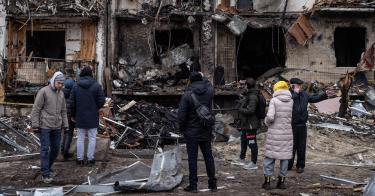The Russian invasion of Ukraine, which began in 2014, has resumed. Putin was not deterred. The threat of sanctions failed to stop Putin from launching a full-scale assault spanning the width and depth of Ukraine.
This wasn’t just a nibble to expand the territory Russia holds in the Donbas; missile and aircraft strikes took place all through the country. Russian paratroops were reported in the western port city of Odessa, and Russian tanks have been filmed roaring nearby the abandoned Chernobyl nuclear power plant.
Putin may not intend to take and hold all of Ukraine, but his newly stated objective—"the demilitarization and denazification of Ukraine"—certainly bodes ill for Ukrainian independence and democracy. At the very least, Putin’s military objectives appear more significant than many had envisioned.
For example, early troop movements suggest that Putin seeks to establish a land bridge from Russia to Crimea. That would require Russian troops seizing and holding Donetsk. Russia earlier this week recognized Donetsk as being independent of Ukraine and Russian forces are on the move there. If successful, that advance would turn the Sea of Azov into a Russian lake and allow Moscow to control entry to the Volga-Don canal, which connects the Black Sea to the Caspian Sea.
>>> How the U.S. Should Help Defend Ukraine
Of course, all we can do at this stage is guess about Putin’s ultimate objectives. It may be that even Putin doesn’t know for sure how far he will drive west. Some of this answer rests on the Ukrainian military’s ability and willingness to fight.
The West has not been entirely passive. Putin’s actions have triggered the "maximalist" response threatened by NATO: sanctions, political solidarity in support of Ukraine, various kinds of assistance, and increased deployments of NATO assets to demonstrate a determination to safeguard NATO territory. The alliance has therefor demonstrated the resolve to do what it said it would. Yet clearly, those threatened actions were not enough to deter Putin.
Biden, too, has done what he threatened. But he continues to look like he is slow walking through the crisis. It took several hours for the administration even to clearly acknowledge that Ukraine had been "further" invaded. Biden’s clock seems to be running a day behind Putin’s.
Biden’s boosters claim that he is leading the West’s response. The Washington Post even rolled out an editorial claiming that Ukrainians are "lucky" this action didn’t occur on Trump’s watch. To make that argument, one must skip over the historical fact that Putin did nothing on Trump’s watch other than continue to skirmish along the line of contact that the Russian Duma has now officially, and illegally, erased.
Of course, historical comparisons don’t change the present or the future. What’s more important now is to look at the timeline and weight of our current president’s response. It has been underwhelming, to say the least. Biden has never pressed ahead of where, collectively, the allies were willing to go. That’s not leadership, that’s treating statecraft and military decision-making like a summer camp experience. Further, this is cold comfort for Ukrainians. They are the ones now facing the dogs of war.
>>> Beyond Ukraine: Worry About Putin Meddling in Africa
Biden made an equal muddle at home. He never made a decisive case for defending America’s interests. Even today, most Americans don’t understand that the chief beneficiary of a Europe destabilized by an aggressive Putin is China. Checkmating Putin is a critical step in dealing with the China threat and that is crucially important to American security.
As we move into the next phase of this crisis, we know only two things. One: Putin is acting, and Biden is reacting… slowly. Two: It is still unclear how Biden intends to deal with this crisis, and we have no idea on how he will deal with the next one.
Putin’s ambitions don’t stop with Ukraine. If he is going to be checked, the United States and its allies have to build sufficient strategic and conventional deterrence to checkmate his military and enough energy independence and energy security to short-circuit his ability to weaponize oil and gas exports. Until Biden makes clear that he has a solid plan for accomplishing this, Americans and their allies will continue to question his desire and even his ability to lead.
This piece originally appeared in Fox News




